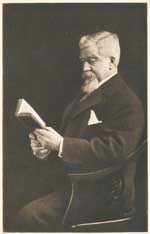Some time back I remember someone asking whether Machen’s father was in fact a Christian. Later, while working through our collection of pamphlets by Dr. J. Gresham Machen, I came across an offprint titled CHRISTIANITY IN CONFLICT (1932), and noted the following remembrances that Machen offers regarding his father.
[from “Christianity in Conflict,” as published in Contemporary American Theology, edited by Vergilius Ferm (New York: Round Table Press, 1932), pp. 246-247.]
 My father was a lawyer, whose practice had been one of the best in the State of Maryland. But the success which he attained at the bar did not serve in the slightest to make him narrow in his interests. All his life he was a tremendous reader, and reading to him was never a task. I suppose it never occurred to him to read merely from a sense of duty; he read because he loved to read. He would probably have been greatly amused if anyone had called him a “scholar”; yet his knowledge of Latin and Greek and English and French literature (to say nothing of Italian, which he took up for the fun of it when he was well over eighty and was thus in a period of life which in other men might be regarded as old age) would put our professional scholars to shame.
My father was a lawyer, whose practice had been one of the best in the State of Maryland. But the success which he attained at the bar did not serve in the slightest to make him narrow in his interests. All his life he was a tremendous reader, and reading to him was never a task. I suppose it never occurred to him to read merely from a sense of duty; he read because he loved to read. He would probably have been greatly amused if anyone had called him a “scholar”; yet his knowledge of Latin and Greek and English and French literature (to say nothing of Italian, which he took up for the fun of it when he was well over eighty and was thus in a period of life which in other men might be regarded as old age) would put our professional scholars to shame.
With his knowledge of literature there went a keen appreciation of beauty in other fields—an appreciation which both my brothers have inherited. One of my father’s most marked characteristics was his desire to have contact with the very best. The second-best always left him dissatisfied; and so the editions of the English classics, for example, that found place in his library were always carefully chosen. As I think of them, I am filled with renewed dismay by that provision of the Vestal Copyright Bill, nearly made a law in the last Congress, which would erect a Chinese wall of exclusion around our country and prevent our citizens from having contact with many things that are finest and most beautiful in the art of the printing and binding of books.
My father’s special “hobby” was the study and collection of early editions—particularly fifteenth-century editions of the Greek and Latin classics. Some fine old books were handed down to him from his father’s home in Virginia, but others he acquired in the latter part of his long life. His modest means did not suffice, of course, for wholesale acquisitions, but he did try to pick up here and there really good examples of the work of the famous early printers. He was little interested in imperfect copies; everything that he secured was certain to be the very best. I can hardly think of his love of old books as a “hobby”; it was so utterly spontaneous and devoid of self-consciousness. He loved the beautiful form of the old books, as he loved their contents; and the acquisition of every book on his shelves was a true expression of that love.
He was a profoundly Christian man, who had read widely and meditated earnestly upon the really great things of our holy Faith. His Christian experience was not of the emotional or pietistical type, but was a quiet stream whose waters ran deep. He did not adopt that “Touch not, taste not, handle not” attitude toward the good things or the wonders of God’s world which too often today cause earnest Christian people to consecrate to God only an impoverished man, but in his case true learning and true piety went hand in hand. Every Sunday morning and Sunday night, and on Wednesday night, he was in his place in Church, and a similar faithfulness characterized all his service as an elder in the Presbyterian Church.
[For those who might be interested in reading further, I have prepared a PDF edition of the full article, which is available here.]
